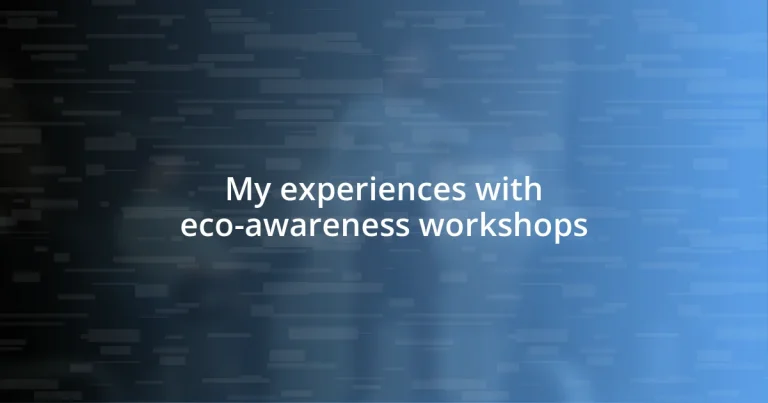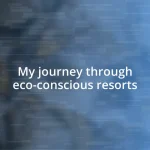Key takeaways:
- Eco-awareness workshops foster personal reflection and community engagement around sustainability, encouraging participants to explore their unique relationships with nature.
- Participants gain practical knowledge and actionable tools to implement eco-friendly practices in their daily lives, enhancing their sense of responsibility towards the environment.
- Workshops offer diverse activities, like hands-on projects and collaborative discussions, that develop essential skills such as communication, critical thinking, and practical life skills related to sustainability.
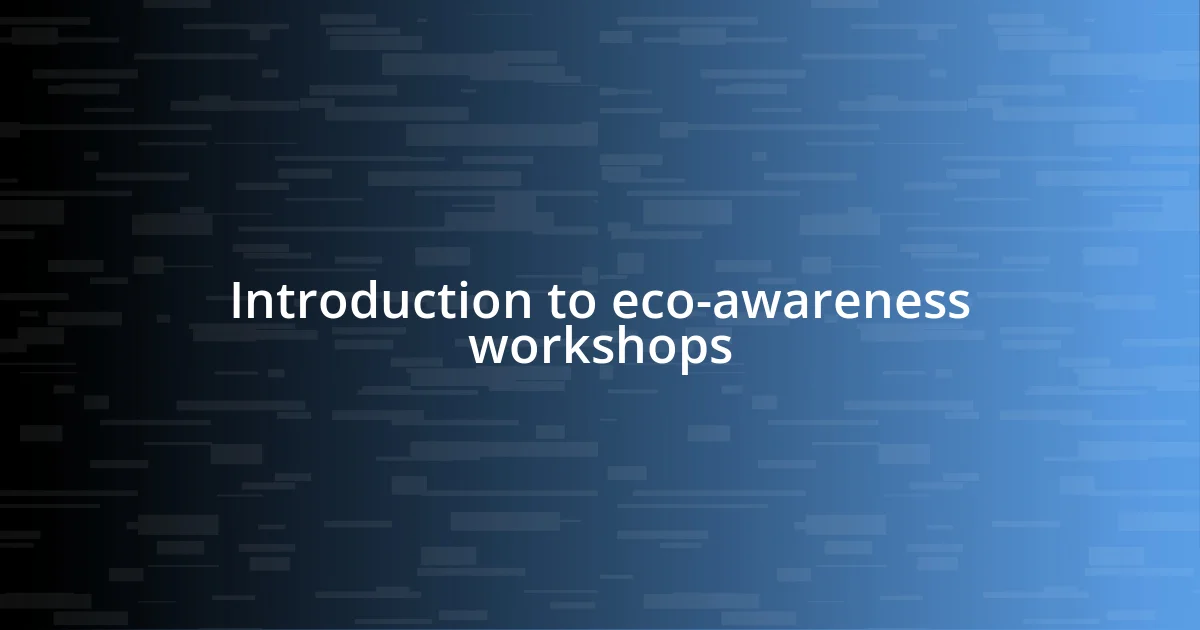
Introduction to eco-awareness workshops
Eco-awareness workshops are eye-opening experiences that can transform how we perceive our environment. I remember walking into my first workshop, feeling a mix of curiosity and skepticism. Little did I know, it would ignite a passion for sustainability that I never knew I had.
These workshops create a space for exploration and dialogue around pressing environmental issues. I vividly recall a moment when a facilitator asked us, “What does sustainability mean to you?” This question struck a chord, prompting each participant to reflect on their unique relationship with nature. The discussions that followed were not just enlightening; they were deeply personal, revealing a tapestry of emotions tied to our individual experiences.
Through hands-on activities and shared stories, eco-awareness workshops facilitate a deeper understanding of our environmental impact. I felt an overwhelming sense of community when we discussed actionable steps we could take in our daily lives. It made me realize that every small change counts, and together, we can make a significant difference. Have you ever thought about how your choices affect the planet? Reflecting on that can be quite powerful.
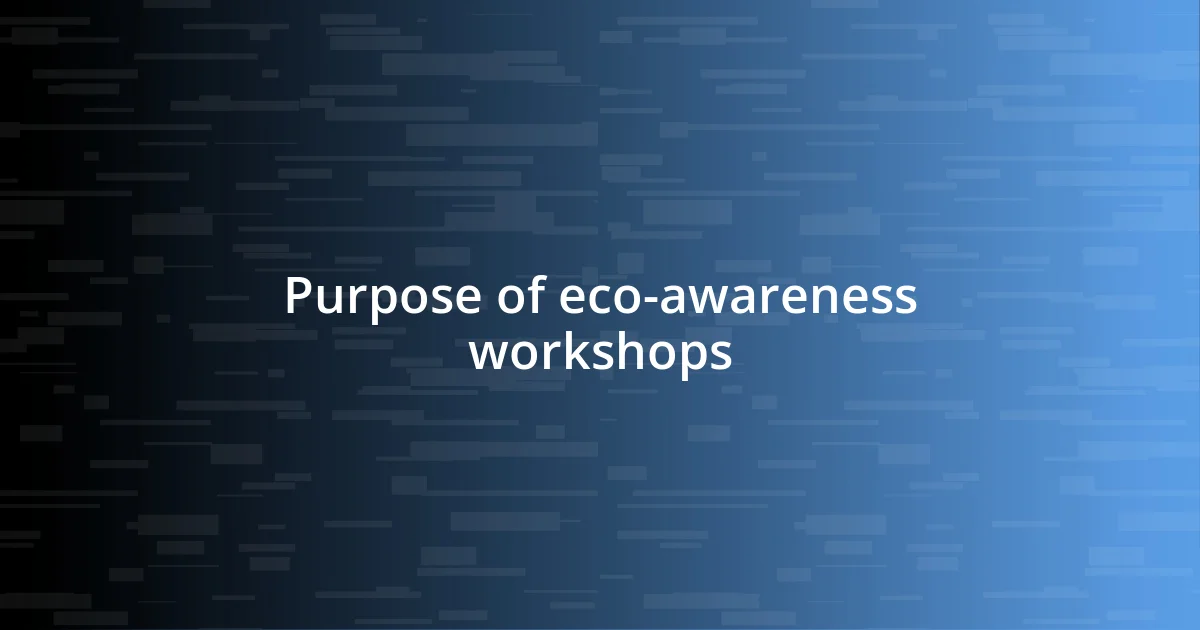
Purpose of eco-awareness workshops
The primary purpose of eco-awareness workshops is to educate participants about environmental challenges and inspire actionable change. I remember one workshop focused on plastic pollution, where the facilitator showed a striking visual of marine life affected by waste. That moment hit home, pushing me to reconsider my own plastic usage and sparking a desire to advocate for alternatives.
In these workshops, participants engage in a variety of activities that highlight individual and collective responsibility. Here’s a snapshot of their aims:
- Increase Knowledge: Providing information on environmental issues and sustainable practices.
- Cultivate Mindfulness: Encouraging participants to reflect on their consumption habits and their impact on the planet.
- Build Community: Fostering connections among like-minded individuals to strengthen the movement toward sustainability.
- Empower Action: Offering tools and strategies to implement eco-friendly practices in daily routines.
These objectives are not just theoretical; they resonate deeply within the hearts of participants, fostering a sense of urgency and connection to the Earth. Each experience has the potential to inspire real change, not only within oneself but also in the wider community.
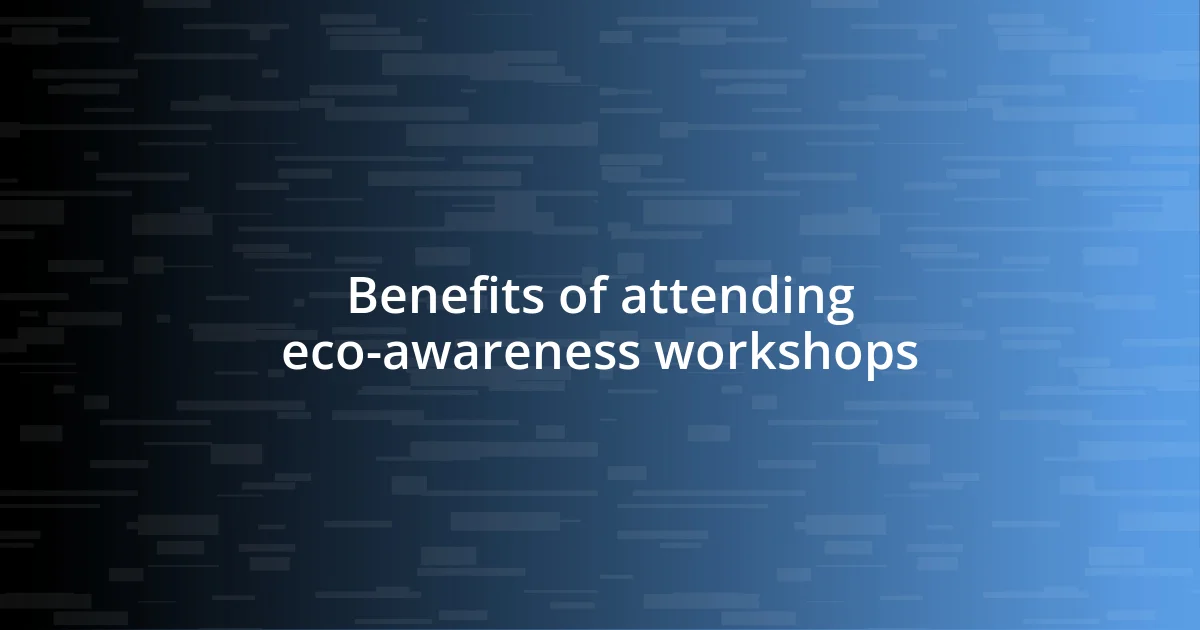
Benefits of attending eco-awareness workshops
Attending eco-awareness workshops brings a wealth of benefits that I believe everyone should experience firsthand. For starters, they equip you with practical knowledge about environmental challenges and sustainable practices. I fondly remember a workshop focused on urban gardening where we learned to grow our own vegetables. This experience not only brought me closer to the food I consume but also instilled a profound respect for nature’s resources and processes.
Moreover, workshops foster a real sense of community. I distinctly recall chatting with fellow participants over lunch, sharing our personal sustainability journeys. These conversations revealed common struggles and triumphs, helping to build connections that extend beyond the workshop. Feeling part of a larger movement reinforces my commitment to making changes in my life, knowing that others are on the same journey with me.
Perhaps one of the most empowering aspects of these workshops is the actionable tools they provide. I still use a simple guide we created to track our waste reduction goals, which has made a huge impact on how I approach sustainability. Every small achievement, like reducing my plastic usage or composting, feels monumental when celebrated within a supportive group. It’s a reminder that we’re all capable of making a difference, and those workshops fuel that motivation in an incredibly fulfilling way.
| Benefit | Detail |
|---|---|
| Practical Knowledge | Workshops provide insights on environmental challenges, enhancing understanding of sustainability practices. |
| Community Building | Participants form meaningful connections, creating a support network that encourages ongoing engagement in eco-friendly actions. |
| Empowerment | Workshops equip attendees with tools and strategies for implementing sustainable practices in their everyday lives. |
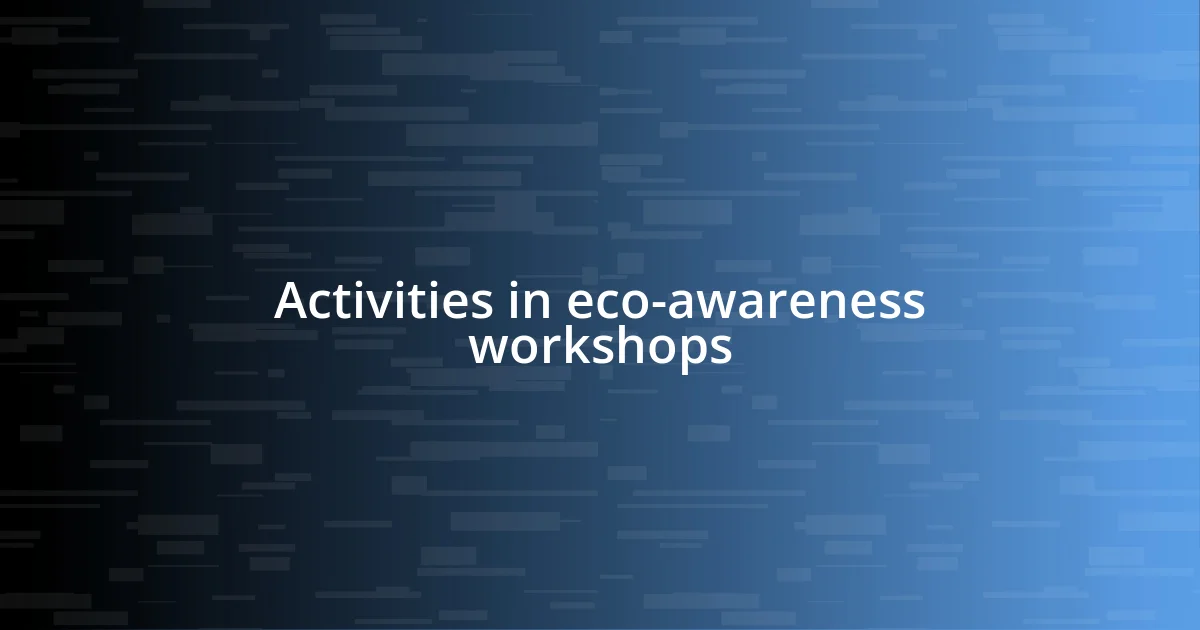
Activities in eco-awareness workshops
Activities in eco-awareness workshops vary widely, each designed to engage participants in unique ways. I particularly enjoyed the hands-on sessions, like making DIY natural cleaning products. It felt liberating to create something useful while eliminating harmful chemicals from my home. Have you ever considered how many toxic substances we bring into our lives daily? This activity underscored that awareness is just the first step; action is where the real change begins.
One memorable activity that stood out was the zero-waste challenge. We had to identify items we usually discard and brainstorm sustainable alternatives. I discovered how much I relied on single-use plastics, and I couldn’t help but feel a pang of guilt. But rather than wallow in that emotion, we collectively turned it into motivation. Sharing our challenges and solutions created a spirited atmosphere, as if we were all in this together, rallying for a greener future.
Creative expression also played a role in the workshops through art projects using recycled materials. One day, we collaborated to create a mural that showcased our visions for a sustainable future. As we painted together, laughter filled the air, blending artistic expression with our eco-message. It was amazing to witness how creativity could amplify our commitment to the environment. Doesn’t that synergy of art and advocacy just ignite a spark within you? These activities are more than just fun distractions; they deepen our understanding and strengthen our resolve to be the change we wish to see.
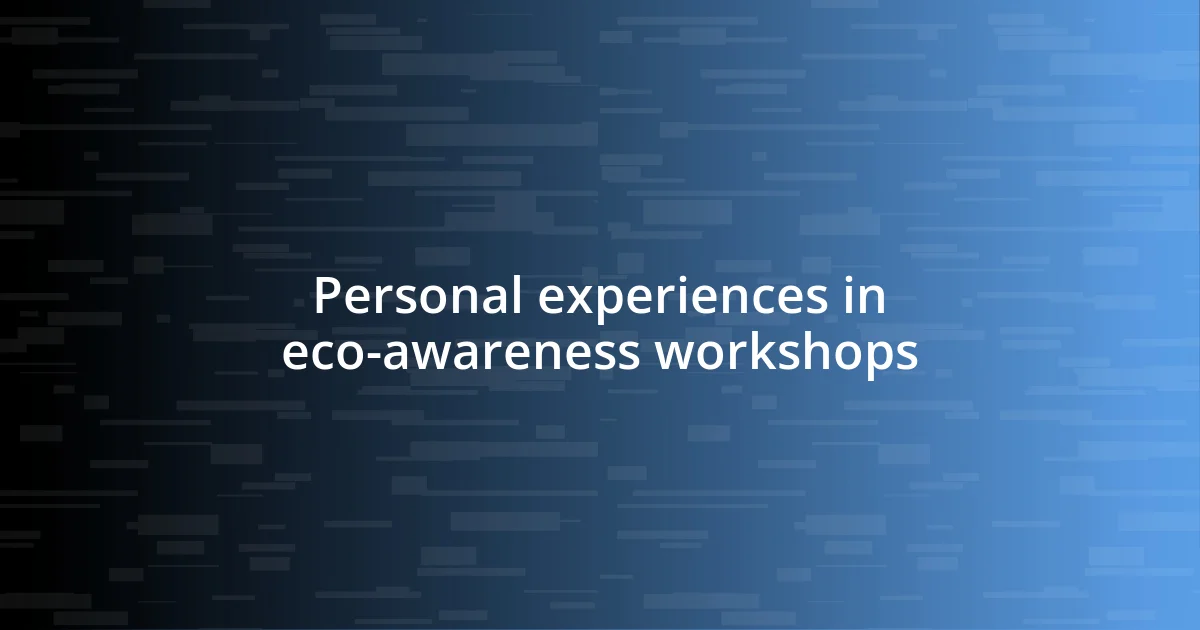
Personal experiences in eco-awareness workshops
I remember the first eco-awareness workshop I attended; it felt like stepping into a whole new world. The moment we gathered around to discuss climate change, I couldn’t help but feel both anxious and excited. Listening to experts share stories of environmental triumphs and challenges ignited a passion within me. Have you ever felt that electric surge when you realize you’re part of something bigger? It was then that I understood the real power of collective awareness.
In another workshop, we tackled the idea of sustainable consumption through an interactive quiz. I was surprised by how little I knew about the lifecycle of everyday products. It was eye-opening to learn that my simple purchases had deeper environmental implications. The laughter and camaraderie we shared while competing against each other transformed what could have been a heavy topic into an engaging discussion. That combination of fun and learning reinforced the idea that eco-awareness doesn’t have to be a chore; instead, it can be an enriching experience.
I’ve also taken part in mindfulness sessions focused on nature. During one, we meditated in a local park, honing our awareness of the sounds and scents around us. This practice deepened my appreciation for the natural world, allowing me to connect with it on a more spiritual level. I could feel nature’s energy invigorating me, and it made me realize how vital it is to protect these spaces. Isn’t it incredible how simple moments can lead to profound realizations about our responsibility towards the environment? Each workshop left me with more than just knowledge; they nurtured a growing commitment to live more sustainably.
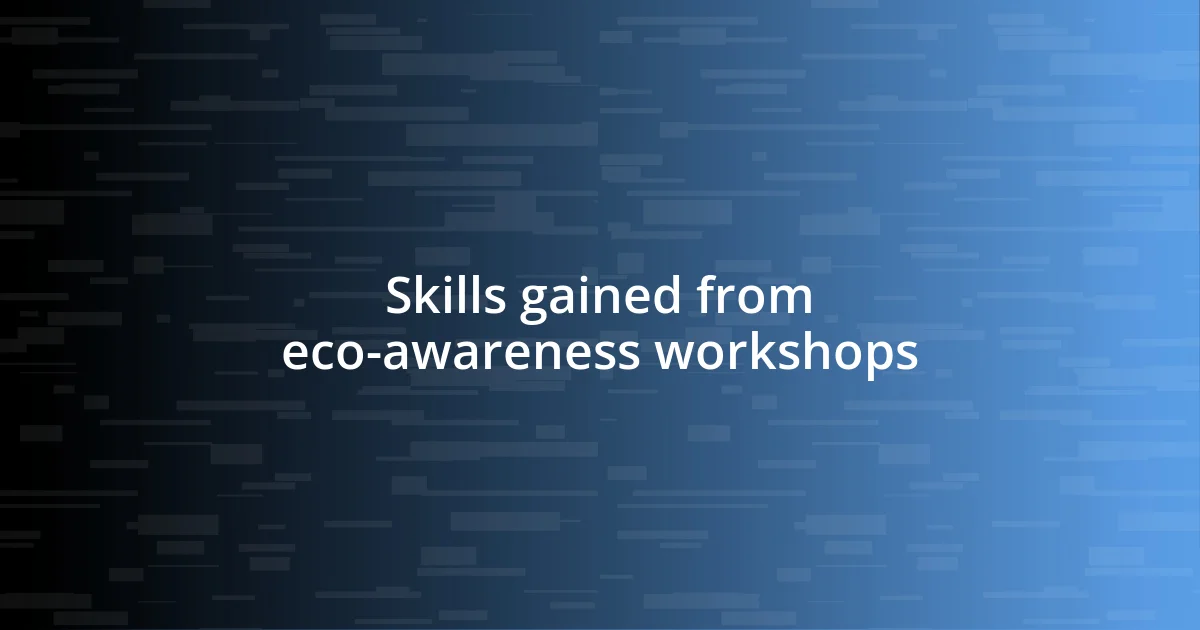
Skills gained from eco-awareness workshops
Participating in eco-awareness workshops equipped me with invaluable skills that extend beyond the environment. One transformative experience was engaging in group discussions on sustainable practices. Not only did I enhance my communication abilities, but I also learned how to articulate ideas about eco-friendliness clearly and persuasively. Have you ever noticed how powerful words can be when advocating for change? It’s like planting a seed; the right message can inspire action in others.
Another skill I developed was critical thinking through problem-solving exercises. I vividly recall an activity where we were divided into teams to brainstorm solutions for reducing waste in our communities. The exercise required us to analyze local needs, identify feasible goals, and present our proposals. This experience highlighted how collaboration can foster innovation. I found myself asking, “What if we encouraged local businesses to adopt greener practices?” That kind of questioning pushed us to explore new ideas that might lead to real impact.
Lastly, I gained practical life skills, like gardening and composting, which I initially thought would be beyond my reach. During one workshop, I got my hands dirty learning how to cultivate plants from kitchen scraps. The joy of seeing something I nurtured grow gave me a sense of accomplishment that I didn’t expect. Isn’t it fulfilling to see your efforts blossom into something tangible? These workshops truly transformed my perspective, allowing me to take action for the environment while also enriching my everyday life.












